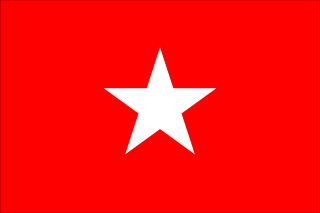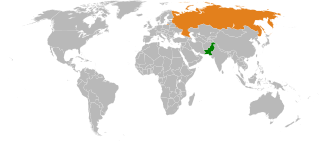Related Research Articles

The International Confederation of Free Trade Unions (ICFTU) was an international trade union. It came into being on 7 December 1949 following a split within the World Federation of Trade Unions (WFTU), and was dissolved on 31 October 2006 when it merged with the World Confederation of Labour (WCL) to form the International Trade Union Confederation (ITUC).

The All-India Muslim League was a political party established in 1906 in British India. Its strong advocacy, from 1930 onwards, for the establishment of a separate Muslim-majority nation-state, Pakistan, successfully led to the partition of India in 1947 by the British Empire.

Faiz Ahmad Faiz was a Pakistani poet, and author in Urdu and Punjabi language. He was one of the most celebrated writers of the Urdu language in Pakistan. Outside literature, he has been described as "a man of wide experience" having been a teacher, an army officer, a journalist, a trade unionist and a broadcaster.

The National Awami Party (NAP), translated from Urdu to English as National People's Party, was the major left-wing political party in East and West Pakistan. It was founded in 1957 in Dhaka, erstwhile East Pakistan, by Abdul Hamid Khan Bhashani and Yar Mohammad Khan, through the merger of various leftist and progressive political groups in Pakistan. Commonly known as the NAP, it was a major opposition party to Pakistani military regimes for much of the late 1950s and mid-1960s. In 1967 the party split into two factions, one in East Pakistan and another in West Pakistan.

The World Confederation of Labour (WCL) was an international labour organization founded in 1920 and based in Europe. Totalitarian governments of the 1930s repressed the federation and imprisoned many of its leaders, limiting operations until the end of World War II. In 2006 it became part of the International Trade Union Confederation (ITUC), ending its existence as an independent organization.

The Mazdoor Kisan Party (MKP) is a political party in Pakistan with communist and socialist leanings. In the 1970s, it led a militant communist movement in Hashtnagar, Charsadda District, Pakistan.
Mohammad Toaha was a language activist of the 1952 language movement and a prominent left-wing politician from Bangladesh.
The Lahore Chamber of Commerce & Industry(LCCI) was established in 1923. It was established to serve and represent the interests of the business community in Lahore, Pakistan.

Pakistan–Russia relations or Russo-Pakistani relations refers to the bilateral relations between the Islamic Republic of Pakistan and the Russian Federation. The Soviet Union and Pakistan first established the diplomatic and bilateral relations on 1 May 1948. On May 1, 2018, Pakistan celebrated the 70th Anniversary of Diplomatic Relations with Russia.

In 1972, Pakistan's largest city, Karachi, witnessed major labour unrest in its industrial areas of S.I.T.E Industrial Area and Korangi-Landhi. Several protesting workers were killed or injured by police during this period. In a number of cases, workers briefly occupied their factories.
The Pakistan Socialist Party was a political party in Pakistan. It was formed out of the branches of the Indian Socialist Party in the areas ceded to the new state of Pakistan. The PSP failed to make any political breakthrough in Pakistani politics. Being a secular socialist party, which had strongly opposed the creation of the state Pakistan, the PSP found itself politically isolated and with little mass appeal. The party was labelled as traitors and kafirs by its opponents. The PSP found it difficult to compete with the Islamic socialism that Liaquat Ali Khan professed to in 1949.
The influences of socialism and socialist movements in Pakistan have taken many different forms as a counterpart to political conservatism, from the groups like The Struggle, Lal Salam which is the Pakistani section of the International Marxist Tendency, to the Stalinist group like Communist Party through to the reformist electoral project enshrined in the birth of the Pakistan Peoples Party (PPP)

The Ghana Trades Union Congress is a national centre that unites various workers' organizations in Ghana. The organization was established in 1945.
The Somali Confederation of Labour was a national trade union centre in Somalia. CSL was founded in 1949. CSL was closely linked to the ruling Somali Youth League, but retained organizational independence.

On May 18, 2010, a bombing took place in Kachi Paind Khan area of Dera Ismail Khan. The bomb was planted on a motorcycle and killed 13 people while injured 14 on its detonation. Deputy superintendent of Kulachi police, Muhammad Iqbal Khan was also among the deceased and was said to be the target of attack.
Trade unions in Pakistan are regulated under provincial industrial relations acts. Under the Constitution of Pakistan, labour is considered a shared responsibility of the federal and provincial governments. The latest Industrial Relation Act was promulgated on 12 March 2012 by President of Pakistan. National Industrial Relations Commission (NIRC) was established under Labour Policy, 1972 as a quasi-judicial authority to promote genuine trade unionism, setting up industry-wise federations of unions and at the national levels. According to NIRC, in 2016 there were 1,390 trade unions with registered 1.4 million members. There are 16 registered federations and the ratio of total union members to total employment is 2.2%.
The French Federation of Book Workers was a trade union representing printing workers in France.
References
- 1 2 3 4 M. Ali Raza (April 1967). "Alternatives in Pakistan. Trade Union Developments and Ideologies". The Journal of Developing Areas. 1 (3): 333–356. JSTOR 4189386.
- ↑ Ali, Kamran Asdar (February 2005). "The Strength of the Street Meets the Strength of the State: The 1972 Labour Struggle in Karachi". International Journal of Middle East Studies. 37 (1): 103. doi:10.1017/S0020743805050063. JSTOR 3880083. S2CID 162025193.
- ↑ Keddie, Nikki R. (August 1957). "Labor Problems of Pakistan". The Journal of Asian Studies. 16 (4): 585. doi:10.2307/2941640. JSTOR 2941640.
- 1 2 Zakaullah Khan Khalil (2018). A Profile of Trade Unionism and Industrial Relations in Pakistan (PDF) (Report). International Labour Organization.